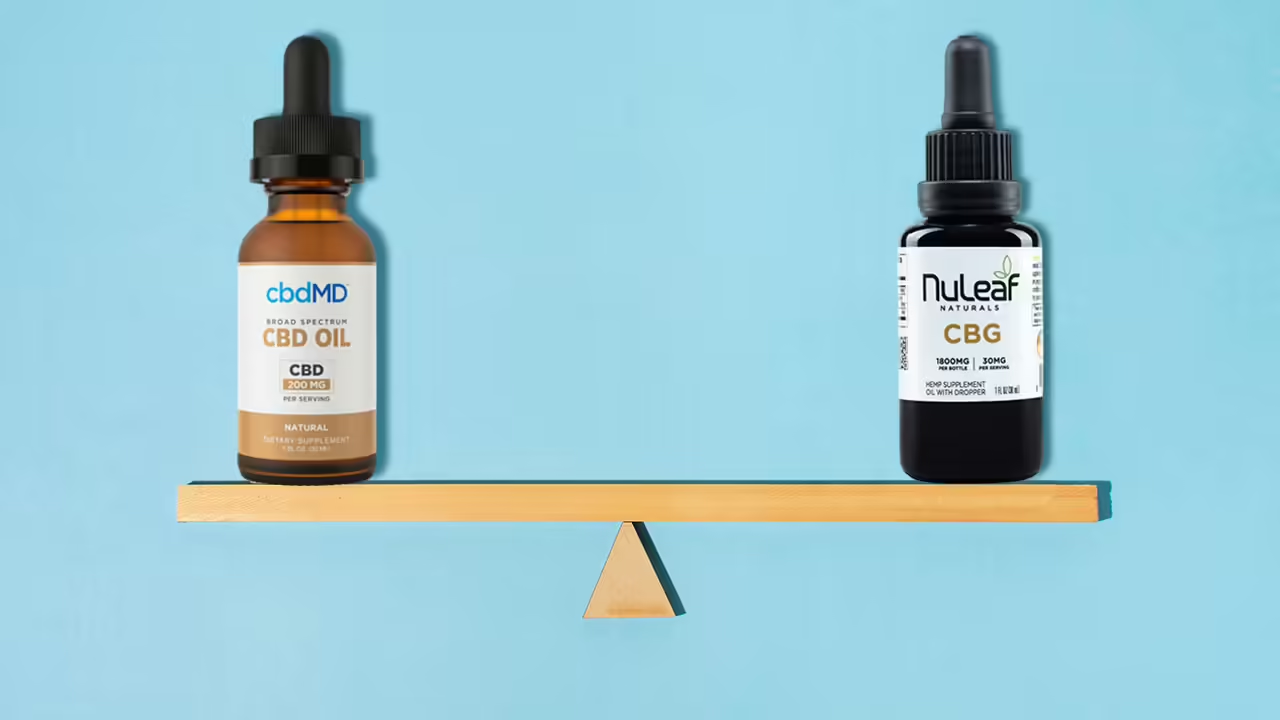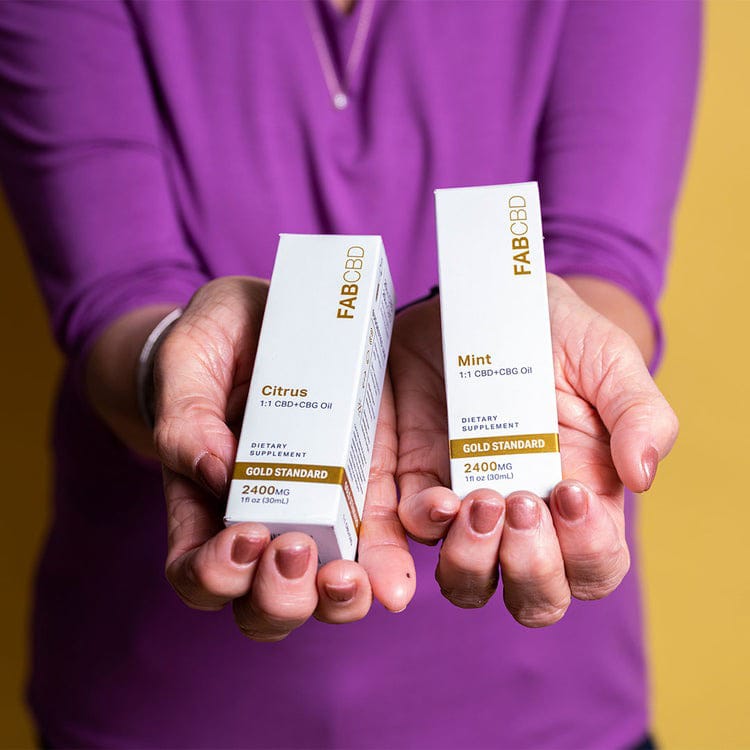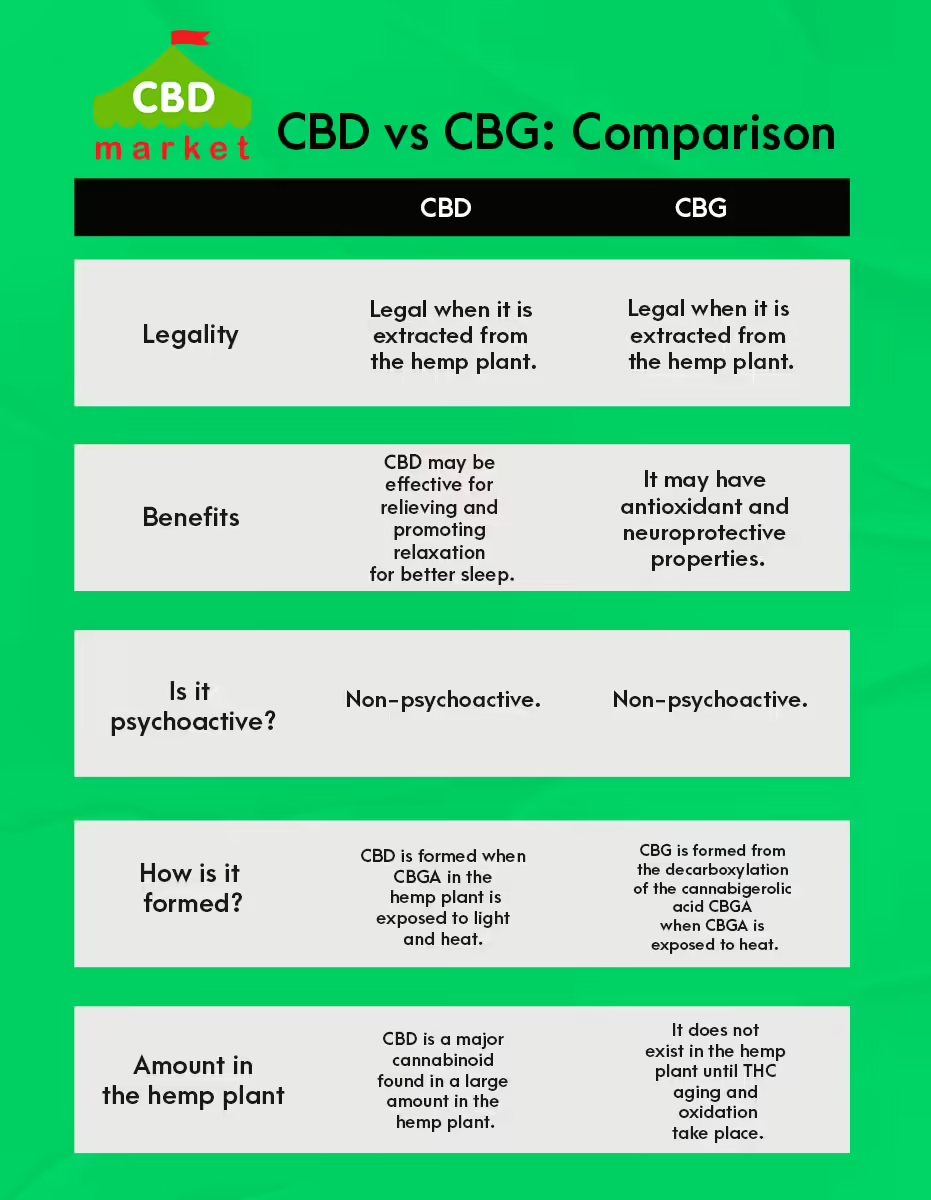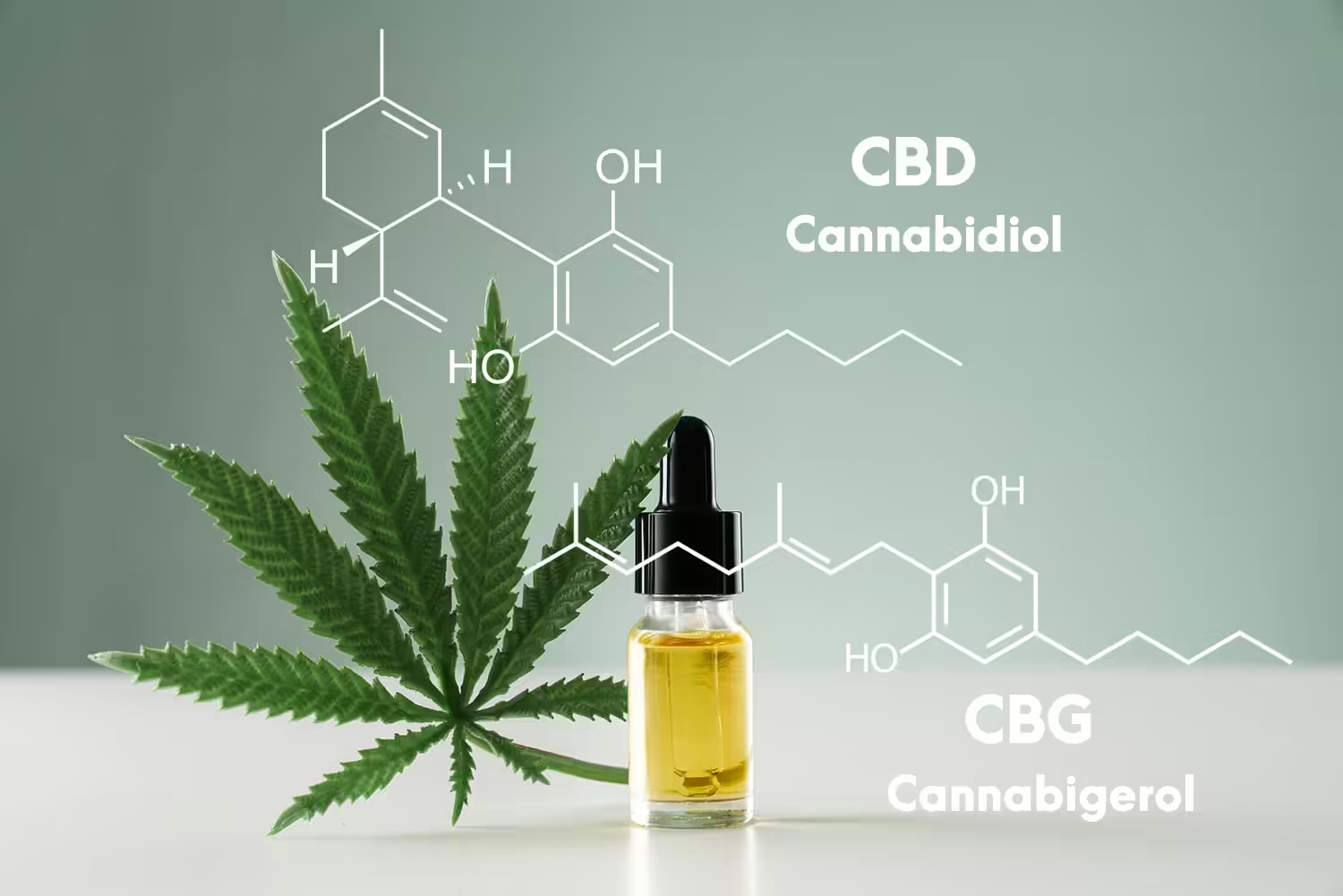CBD vs. CBG: Which Cannabinoid Should You Choose?
Summarize

CBD and CBG are both phytocannabinoids in the cannabis plant. “Phyto” means they are natural cannabinoids. When you shop for products, you will notice a growing number of CBD products that contain additional amounts of CBG. Comparing CBG vs. CBD shows they are both beneficial per anecdotal and clinical research, but they also have distinct chemical structures and effects differences.

TL;DR (Too Long; Didn’t Read):
CBD and CBG are phytocannabinoids found in cannabis plants. Though similar, the differences in their chemical structures produce different effects. CBD is a major, and CBG is a minor cannabinoid. They each may produce effects, but they do so in other ways. CBD and CBD are anti-oxidants, non-psychoactive and legal as long as they are extracted from the hemp plant.
Table of Contents
What is CBD?
CBD is a compound found in the cannabis plant. Since the law requires the extraction of CBD from plants with no more than 0.3% THC, a particular cannabis plant strain called hemp (cannabis sativa) was developed.
There are approximately 144 cannabinoids found in the cannabis plant, and some researchers believe there may be up to 200. CBD is one of the most abundant cannabinoids in the hemp plant, with the other being THC. CBD (cannabidiol) is extracted from the leaves, buds and flowers of the hemp plant.
CBD interacts with the endocannabinoid system (ECS) to produce its effects. Researchers are still learning how CBD works, but it is believed to primarily interact with ECS receptors in the Central Nervous System (CNS). Clinical studies have found that CBD may help improve sleep quality and improve overall well-being, to name a few effects.
What is CBG?
CBG is also a cannabinoid in the cannabis plant. It is a minor cannabinoid in terms of quantity because of the natural chemical process that must occur before CBG is formed. CBGA, the acidic form of CBD, is a precursor cannabinoid. As the cannabis plant matures, the parent chemical CBGA serves as a direct precursor to the formation of CBG, THC and CBD.
The process starts with CBGA (cannabigerolic acid). The young hemp plant’s exposure to sunlight and heat triggers biosynthesis called decarboxylation. During this transformation, CBGA is decarboxylated and becomes CBG, THC and CBD.
CBD vs. CBG: Differences
The first difference is that CBD is a major cannabinoid while CBG is a minor one. They both have a similar molecular structure. However, the atoms are arranged differently, leading to differences in how each phytocannabinoid interacts with the endocannabinoid system.
For example, CBG may be an appetite stimulant, while CBD has been found to be an appetite suppressant. CBG is becoming recognized for its antibacterial effects. In fact, CBG may outperform CBD. Current research is also studying its neuroprotective properties.
CBD is more heavily researched, and studies have found a wider range of potential effects. It may take action on the immune system and improve sleep quality.
CBD vs CBG Comparison Chart

CBD vs. CBG: What do They Have in Common?
CBD and CBG are both derived from the precursor CBGA cannabinoid. Enzymes trigger the conversion process that produces CBD, CBG and THC. CBD and CBG are not psychoactive, which is one reason they have become popular options for individuals looking for natural alternatives to address various wellness issues.
Both CBD and CBG modify cellular metabolism through interactions with the endocannabinoid system of CB1 and CB2 receptors and other receptors like serotonin. Both are antioxidants that promote cell health. In fact, both CBD and CBG have exhibited antifungal and antibacterial effects.
In addition to these positive effects, CBD and CBG may have neuroprotective benefits and improve sleep. Comparing CBD vs CBG for sleep, the research has shown evidence that CBD may help with sleep by calming the nervous system. The effect of CBG on sleep is not fully known at this point, but there is evidence it inhibits the uptake of the neurotransmitter GABA. GABA is involved in sleep and mood regulation.
CBD and CBG may help with the perception by interacting with the CB1 and CB2 receptors in the endocannabinoid system. CBG has anti-nociceptive qualities, which may block the transmission of discomfort signals. Researchers found that using CBD and CBG together could be more effective than using pure CBD.(8)
CBD vs. CBG Cannabinoid Structure
CBD and CBG have similar chemical structures. The main difference is that CBG has extra hydrogen atoms. Both CBD and CBG have 21 carbon atoms, but they have different molecular shapes. The different shapes determine how they bind to or interact with the CB1 and CB2 receptors in the endocannabinoid system.
The different interactions determine the effects. Both CBD and CBG bind weakly to the CB1 and CB2 receptors, antagonizing the 5-HTiA receptors (serotonin), activating two adrenoceptors (modulating neurotransmitters adrenaline and noradrenaline) and modulating ECS signaling. The degree of interactions is different. CBG also performs additional activities like inhibiting the reuptake of AEA (regulates neurochemical flows) and acting as an agonist in the TRP channels (channels responsible for discomfort). The research on CBG is scarce but increasing.

CBD effects are primarily believed to result from its interaction with CB1 receptors. It may target metabolic cell processes and interact with six TRP channels, activating five and antagonizing one. CBD may lower sensitivity to capsaicin. It is an allosteric modulator of GABA receptors, regulating signaling in a way that may improve sleeping disorders. CBD exerts effects through the activation of adenosine receptors, modulates the functioning of the immune system and may protect against vascular damage through its antioxidant activity.
Is CBG Legal?
The 2018 Farm Bill created the hemp category and removed hemp from the legal Controlled Substances Act’s definition of cannabis.
As long as CBG is extracted from the hemp plant and is in products with less than .3% THC, CBG is legal.
However, it is crucial to know the particular laws in your state or any state you are traveling to. The legality of CBD and other cannabinoids is frequently under scrutiny at the state level.
CBG Benefits Vs. CBD — Which Should I Choose?
To choose CBD vs. CBG, first determine your wellness goals, like reducing feelings of discomfort or improving sleep quality. The CBD CBG chart is a brief comparison of the cannabinoids.
Legality
- CBD is legal when extracted from the hemp plant
- CBG is legal when extracted from the hemp plant
Benefits
- CBD may be an effective compound for relieving and promoting relaxation for better sleep
- CBG may have antioxidant and neuroprotective properties and positive effects on focus and energy
Are They Psychoactive?
• CBD is non-psychoactive
• CBG is non-psychoactive
How Are They Formed?
- CBD is formed when CBGA in the hemp plant is exposed to light and heat as the plant ages through decarboxylation, turning CBGA into CBG, CBDA which becomes CBD, THCA which becomes THC and CBCA which becomes CBC.
- CBG is formed when CBGA in the hemp plant is exposed to light and heat as the plant ages, turning CBGA into CBG through decarboxylation.
Amount in the Hemp Plant
- CBD is a major cannabinoid found in a large amount in the hemp plant.
- CBG does not exist in the hemp plant until the hemp plant ages and turns CBGA into CBG.
FAQs
What is the Difference Between CBG and CBD?
CBG is a minor cannabinoid, and CBD is a major cannabinoid. When the hemp plant is exposed to heat and light, CBGA forms CBDA, THCA, and CBGA, which are then transformed into CBG, CBD and THC.
CBD and CBD phytocannabinoids interact with the endocannabinoid system, and research indicates they share similar effects. However, there also appear to be different effects in terms of potency. For example, CBD research has found that CBD has the potential to take an action on the immune system. Significant CBG research is focusing on CBG’s neuroprotective effects.
Is CBG Stronger than CBD?
So far, researchers have found the overall potency of CBG is less than the potency of CBD. Yet, there are certain areas where CBG has shown promise as being highly effective. For example, the unique properties of CBG are being studied for its action as a potent agonist for the A-2 adrenoceptor, which mediates the function of dopamine, norepinephrine and epinephrine. These neurotransmitters are involved in working memory, mood, sleep and the cardiovascular system.
What Are the Downsides of CBG?
Some people experience side effects when taking CBG. They include drowsiness, dry mouth, dry eyes, dizziness and digestive issues.
Some people also consider the fact that CBG is more expensive as a downside. CBG is a minor cannabinoid in the hemp plant. It is present in a small amount in the full spectrum and broad spectrum products. Developing CBD products with a higher amount of CBG, like in gummies, requires special processing, so the products may cost more.
Is CBG More Difficult To Produce Than CBD?
CBG is more difficult to produce because it is formed in small amounts while the young hemp plant develops. The longer the plant is exposed to heat and light, the less CBG is available because the conversion process produces more CBD and THC.
Important to Stay Informed
There is much more research available on CBD compared to CBG. As more research is conducted, the benefits of CBG will become more evident. Clinical studies and anecdotal evidence suggest that taking CBG and CBD together may produce the entourage effect and increase the effects. Many different products combine CBD and CBG, including tinctures and oils, capsules, gummies, and creams. The products are also available in three spectrums: full spectrum, broad spectrum, and isolate CBD.
Sources
- Freeman, T. P., Hindocha, C., Green, S. F., & Bloomfield, M. A. P. (2019). Medicinal use of cannabis-based products and cannabinoids. BMJ, 365, l1141.
https://www.bmj.com/content/365/bmj.l1141 - Sideris, A., & Doan, L. V. (2024). An Overview of Cannabidiol. Anesthesia & Analgesia, 138(1), 54-68.
https://pubmed.ncbi.nlm.nih.gov/38108806/ - Jastrząb, A., Jarocka-Karpowicz, I., & Skrzydlewska, E. (2022). The Origin and Biomedical Relevance of Cannabigerol. International Journal of Molecular Sciences, 23(14), 7929.
https://www.ncbi.nlm.nih.gov/pmc/articles/PMC9322760/ - Shannon, S., Lewis, N., Lee, H., & Hughes, S. (2019). Cannabidiol in Sleep: A Large Case Series. The Permanente Journal, 23, 18-041.
https://pubmed.ncbi.nlm.nih.gov/30624194/ - Murillo-Rodríguez, E. (2008). The role of the CB1 receptor in the regulation of sleep. Progress in Neuro-Psychopharmacology & Biological Psychiatry, 32(6), 1420-1427.
https://www.med.upenn.edu/cbti/assets/user-content/documents/The%20role%20of%20the%20CB1%20receptor%20in%20the%20regulation%20of%20sleep..pdf - Sepulveda, D. E., Morris, D. P., Raup-Konsavage, W. M., Sun, D., Vrana, K. E., & Graziane, N. M. (2022). Cannabigerol (CBG) attenuates mechanical hypersensitivity elicited by chemotherapy-induced peripheral neuropathy. https://pubmed.ncbi.nlm.nih.gov/35899583/
- Calapai, F., Cardia, L., Esposito, E., Ammendolia, I., Mondello, C., Lo Giudice, R., Gangemi, S., Calapai, G., & Mannucci, C. (2022). Pharmacological Aspects and Biological Effects of Cannabigerol and Its Synthetic Derivatives. Evidence-Based Complementary and Alternative Medicine, 2022, 3336516.
https://www.ncbi.nlm.nih.gov/pmc/articles/PMC9666035/ - Martinez Naya, N., Kelly, J., Corna, G., Golino, M., Abbate, A., & Toldo, S. (2023). Molecular and Cellular Mechanisms of Action of Cannabidiol. Molecules, 28(16), 5980.
https://www.ncbi.nlm.nih.gov/pmc/articles/PMC10458707/ - Nachnani, R., Raup-Konsavage, W. M., & Vrana, K. E. (2021). The Pharmacological Case for Cannabigerol. Journal of Pharmacology and Experimental Therapeutics, 376(2), 204-212.
https://jpet.aspetjournals.org/content/376/2/204.long
Share this post


0